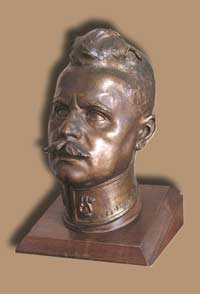Biography
Richard Frycay was born in Kremsier (Czechoslovakia) on March 24th, 1867. Visit of the Franz-Joseph High School and the beginning of his musical education. He completes his apprenticeship of composition (Josef Nesvera) and his conducting technique in Olmütz (during his studies in infantry regiment he got already a junior member). After having passed the exam of conductor, he receives the governmental diploma and appreciation of being piano, violin and organ teacher
1888 – 89 teacher at the Franz-Josef High School of Music in Kremsier
1889 Employment at "Thonet" in Wsetin, a renowned furniture factory, there beside his daily work, he conducts the music band of the company and in addition the Municipal Orchestra
1897 he moves with his family, wife Amalie, daughter Maria and son Richard to Székesfehérvár (Lat. Alba Regia, in the early times coronation town of Hungarian kings). His 40-years lasting musical career starts in the Honvéd (Hungarian regiment), an independent department of the k.u.k. army)
In addition to his military duties he develops strong activities for the music life in town. He offers the popu-lation music with focus on the Hungarian tradition and gives performances of the world repertoire. Besides his task as conductor, he is teacher for music and for singing at the High School of the town and the Girl Se-condary School. 1898 he composes the "Kranitz march" (parade step of the district), known everywhere in the country . Within the following years he writes many pieces of music for the army and fire brigade: Marches, fantasies about the "Kuruzen-Songs" (freedom-fighter) as well folk song marches
|
|
1899 performance with his regiment of the "Schlachten-symphonie" of Beethoven. (Only 1901 follows the pre-miere by the members of the Philharmonia in Budapest .)
In 1902 he gets the Hungarian citizenship, orthography of his name changes into "Frycsaj", 1925 he adopts the today's spelling "Fricsay" of his pseudonym
1912 transfer to Nagyvárad, again establishment of the music life in town
 |
1913 moving to Budapest: Management of the territorial Army Band in Budapest. Living several years as a widower, he marries Berta Lengyel
1914 birth of his second son Ferenc Károly; transfer of the regiment to Bosnia, where he is taken in Serbian captivity
1915 Richard Fricsay returns to Budapest and accepts new tasks of the Music Corps for armed forces and charity, sym-phonic concerts with world-famous artists.
Concert tours: in Munich in front of the Royal Court, Fürth, Nuremberg, Würzburg, Augsburg, Regensburg and Passau. Performance in Bayreuth in presence of Siegfried Wagner and his family (the only Hungarian territorial army conductor who may give a concert with his orchestra in front of him).
He receives the Officer Cross Medal award by the king of Bavaria.
|
1918 guest performances in Bulgaria and Turkey where he is honoured with many awards
1920 after drastic political disturbances Richard Fricsay, meanwhile appointed as a musical director of the Honvéd, takes over the reorganisation of the music in the army :
- To increase the standard of education of the conductors, he achieves that in future conductors of military bands, have to have a diploma of the State Franz-Liszt University to be employed. Giving a good example he passes his examination in 1921. For unemployed musicians and old comrades he creates employments.
- The employment of the orchestra gets more and more difficult: Many of the coffee houses have to close, as well as beer halls. But those which survive can't maintain an orchestra any more. Europe is flooded by jazz, which requires only small ensembles.
- Fricsay enters into a contract with the "English Park" for open air concerts during the summer period. Nearly 15 years the park becomes the center of essential scene for high artistic standard symphonic concerts.
- The growing industry of silent films needs accompaniment, Fricsay makes skilfully use of this fact and plays in the largest cinema hall of the capital with his orchestra in different big formations. Grace to the initiative of Fricsay in these groups many students can earn their cost of living by putting on uniforms during a couple of hours while playing their instruments.
1925 he plays in the Hungarian broadcast free of charge and 1928 he takes the conductorship of the new broadcasting centre. Transmissions of the "English Park Concerts" become an integral part of the Hungarian broadcast programme
1934 Richard Fricsay retires (after 38 years of service and more than 1000 broadcast concerts). His last performance, as a guest conductor, is suddenly interrupted in reason of a siren alarm (air raid) on April 3rd, 1944 in the broadcast
Tired of the hardship during his life and the political clutter he dies on March 16th, 1945.
|

